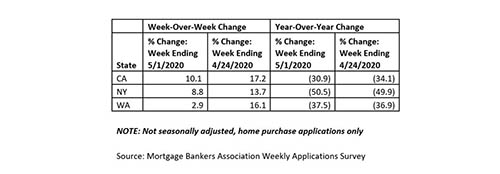
Mortgage Applications Up Slightly in MBA Weekly Survey

Mortgage applications edged up slightly from a week earlier as the 30-year fixed interest rate fell to another record low, the Mortgage Bankers Association reported in its Weekly Mortgage Applications Survey for the week ending May 1.
The Market Composite Index increased by 0.1 percent on a seasonally adjusted basis from one week earlier. On an unadjusted basis, the Index increased by 1 percent compared to the previous week.
The unadjusted Refinance Index decreased by 2 percent from the previous week and was 210 percent higher than the same week one year ago. The refinance share of mortgage activity decreased to 70.0 percent of total applications from 71.6 percent the previous week.
The seasonally adjusted Purchase Index was strong for the second straight week, increasing by 6 percent from one week earlier. The unadjusted Purchase Index increased by 7 percent compared with the previous week and was 19 percent lower than the same week one year ago.
Looking at the impact at the state level, here are results showing the non-seasonally adjusted, week over week percent change in the number of purchase applications from Washington, California and New York:

The FHA share of total applications decreased to 11.1 percent from 11.5 percent the week prior. The VA share of total applications remained unchanged from 13.3 percent the week prior. The USDA share of total applications remained unchanged from 0.5 percent the week prior.
“Mortgage application volume was unchanged last week, even as the 30-year fixed rate mortgage declined to 3.40 percent – a new record in MBA’s survey,” said Mike Fratantoni, MBA Senior Vice President and Chief Economist. “Despite lower rates, refinance applications dropped, as many lenders are offering higher rates for refinances than for purchase loans, and others are suspending the availability of cash-out refinance loans because of their inability to sell them to Fannie Mae and Freddie Mac.”
Fratantoni noted purchase volume increased for the third week in a row, led by strong growth in Arizona, Texas and California. “Although purchase activity remains almost 19 percent below year-ago levels, this annualized deficit has decreased as more states reopen amidst the apparent, pent-up demand for homebuying,” he said.
MBA reported the average contract interest rate for 30-year fixed-rate mortgages with conforming loan balances ($510,400 or less) decreased to 3.40 percent from 3.43 percent, with points decreasing to 0.30 from 0.34 (including origination fee) for 80 percent loan-to-value ratio loans. The effective rate decreased from last week.
The average contract interest rate for 30-year fixed-rate mortgages with jumbo loan balances (greater than $510,400) decreased to 3.69 percent from 3.72 percent, with points increasing to 0.34 from 0.33 (including origination fee) for 80 percent LTV loans. The effective rate decreased from last week.
The average contract interest rate for 30-year fixed-rate mortgages backed by FHA decreased to 3.37 percent from 3.39 percent, with points remaining unchanged at 0.20 (including the origination fee) for 80 percent LTV loans. The effective rate decreased from last week.
The average contract interest rate for 15-year fixed-rate mortgages decreased to 2.93 percent from 2.98 percent, with points increasing to 0.29 from 0.28 (including origination fee) for 80 percent LTV loans. The effective rate decreased from last week.
The average contract interest rate for 5/1 adjustable-rate mortgages decreased to 3.20 percent from 3.29 percent, with points increasing to 0.36 from 0.00 (including origination fee) for 80 percent LTV loans. The effective rate increased from last week.
The ARM share of activity increased to 3.0 percent of total applications.
The survey covers more than 75 percent of all U.S. retail and consumer direct residential mortgage applications and has been conducted weekly since 1990. Respondents include mortgage bankers, commercial banks and thrifts.
